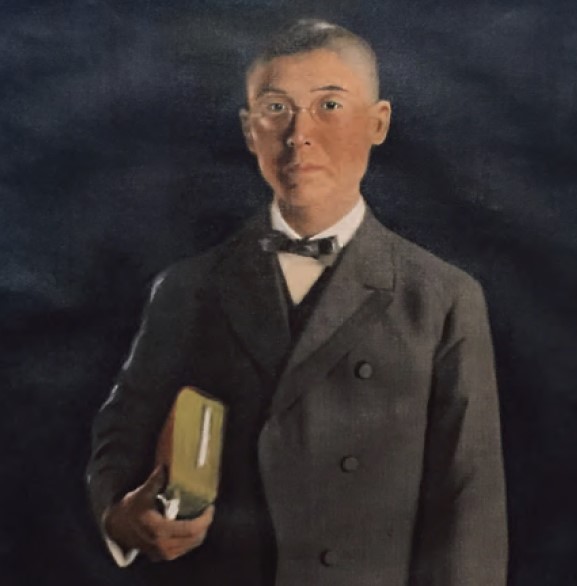
Sherman County farmer Hiram Hisanori Kano was president of the Japanese Americanization Society of Nebraska. This painting hangs in Bishop Beecher Memorial Hall in Mitchell, Nebraska. Photo courtesy of Holy Apostles’ Episcopal Church, Mitchell.
In 1921 the state legislature passed a law barring noncitizens from owning rural land or leasing it longer than five years. Because Japanese immigrants could not become U.S. citizens until 1952, the law effectively barred the “Issei” (first generation Japanese) from owning farms.
North Platte attorney Stephen Kay investigated the politics and public debate surrounding the law. His article (linked below) appears in the Winter 2022 issue of Nebraska History Magazine.
Although all children born in the U.S. were citizens at birth (as per the Fourteenth Amendment), Japanese immigrants themselves were not allowed to naturalize. This was part of a long tradition of race-based restrictions on citizenship, dating back to the Naturalization Act of 1790, which limited naturalization to “free White persons.”
Japanese immigration to the United States became a political issue by the early twentieth century. In the “Gentlemen’s Agreement” of 1907-1908, the Japanese government agreed to stop issuing passports to U.S.-bound laborers. In 1913, California prohibited “aliens ineligible for citizenship” from owning land or signing long-term leases.
Nebraska had only a handful of Japanese immigrants in 1900, but the number grew to nearly 600 by the 1910 census and more than 800 by 1920—mostly in western Nebraska. Japanese immigration and land ownership became an issue at the state’s constitutional convention of 1919-1920. Afterward, the legislature debated a bill to prevent certain classes of aliens from acquiring farmland.
The original bill targeted “aliens not eligible for citizenship.” The idea was to restrict land ownership by Japanese immigrants without placing similar restrictions on European immigrants. The bill did not mention either Japan or race, but it was racial in both intent and effect; it was based on a similar law in California
Leaders in Nebraska’s Japanese community argued against the bill. In February 1921, Charles H. Shinn, Richi Ugai, and Hugh Wada published a statement in the North Platte Semi-Weekly Tribune. “It has been charged that the Japanese are becoming a menace in this State,” they said, arguing that there was no need for alarm because the number of Japanese in Nebraska was actually declining, and that relatively few owned land. They concluded that the Japanese people in the state ask “to be treated fairly, that their industry and their American ideals be rewarded and not penalized.”
Other Nebraskans warned of “Japanese colonization” and interracial marriage. “The average Nebraskan does not realize the menace that lies in the Japanese colonization in this state,” the Alliance Herald warned on February 18. “But other states, notably California and Idaho, have found that once the little brown men gain a foothold, they develop amazing strength….” The North Platte Tribune reported that the law’s proponents argued that Japanese immigrants “bring oriental customs with them when they come to this country, that they tend to settle in colonies, that they do not take to our ways of living,” among other complaints.
Rev. George Allen Beecher, Bishop of the Episcopal Missionary District of Western Nebraska, wrote to the state House Judiciary Committee, calling the alien land bill not only “wrong, but unjust, un-American,” and warned that “It would doubtless result in a growing spirit of race hatred which is always the forerunner of war and bloodshed.”
Rev. Thomas C. Osborne of Bayard (grandfather of the Husker football coach) opposed the law and spoke highly of Japanese residents in the area.
In the end, the bill that applied only to “aliens not eligible for citizenship” did not pass. A substitute bill that applied to all noncitizens passed and signed into law by Gov. Samuel McKelvie on April 26, 1921.
But because Japanese immigrants could not naturalize and European immigrants could, the Alien Land Law still had a racially discriminatory effect. It “blocked Japanese immigrants from purchasing agricultural real estate in the state until the Immigration and Naturalization Act of 1952 became effective,” allowing Japanese immigrants to naturalize as U.S. citizens.
Read the complete article, “Japanese Immigration and Nebraska’s 1921 Alien Land Law” (PDF).
Nebraska History Magazine is published quarterly by History Nebraska. A subscription is a benefit of the “Household Plus” level of membership. Learn more here.
—David L. Bristow, Editor, posted April 17, 2023




